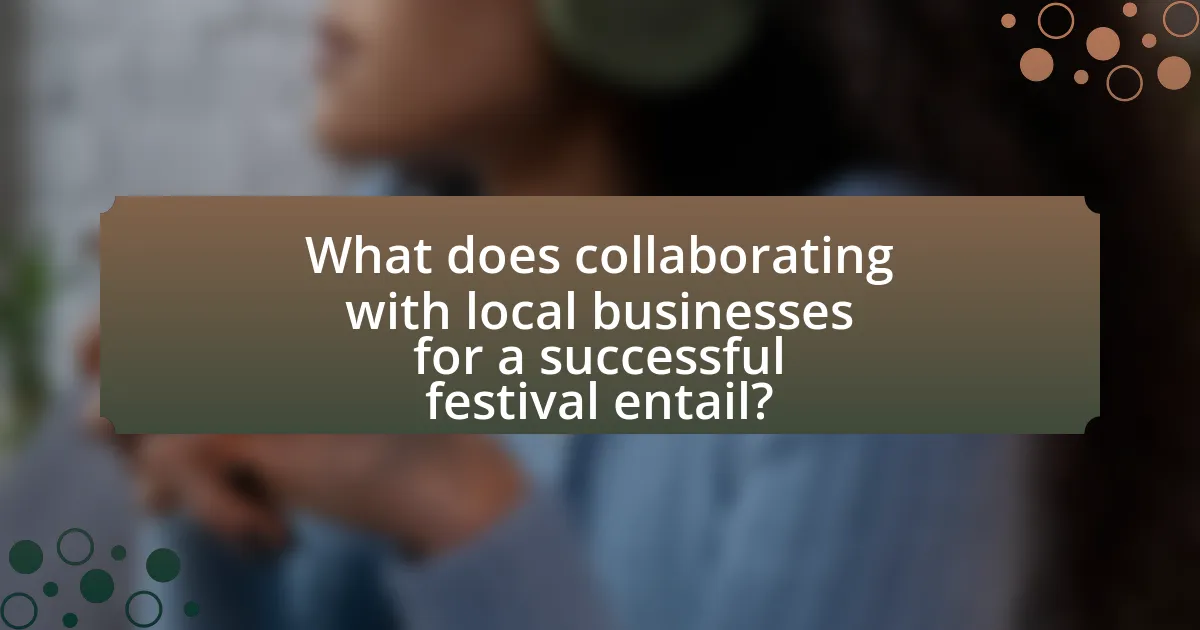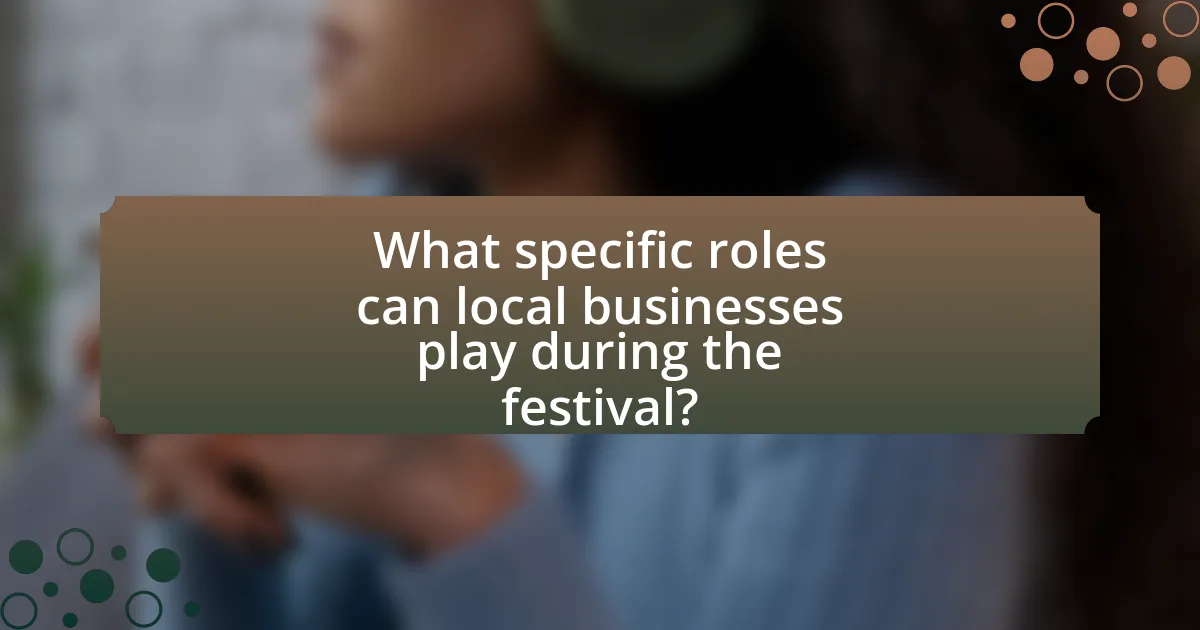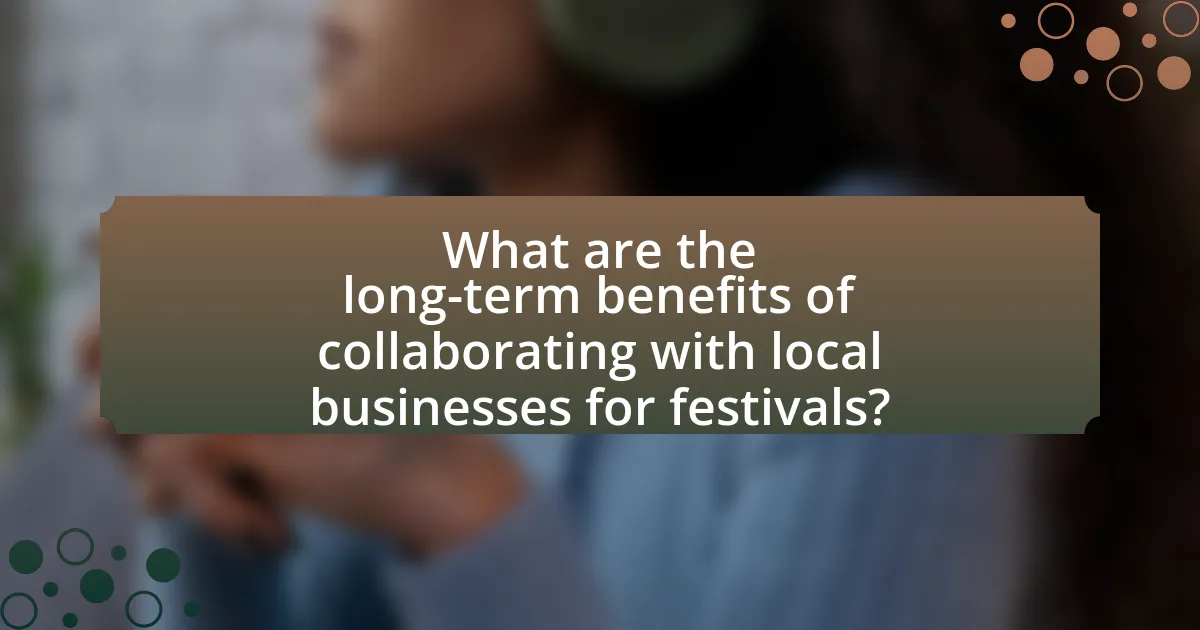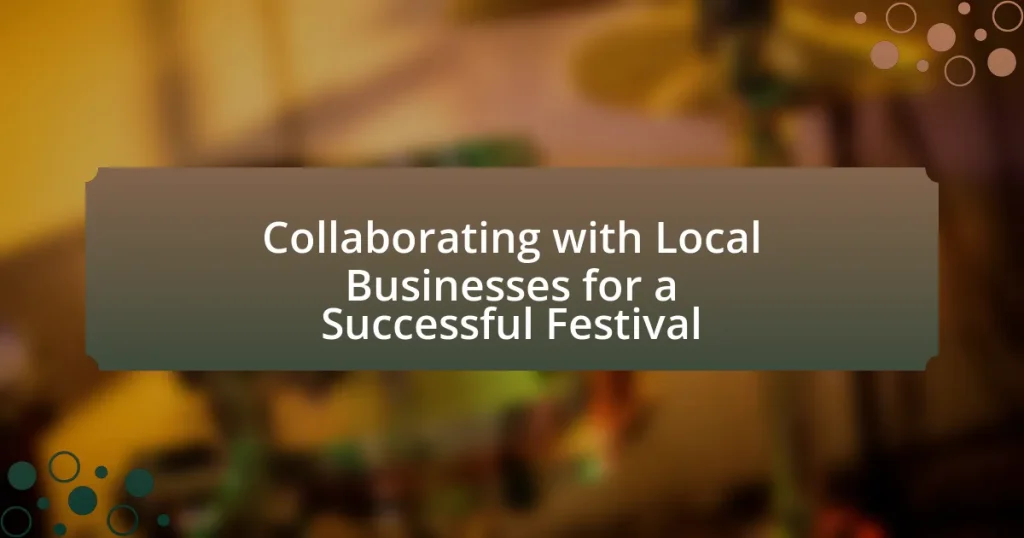Collaborating with local businesses is essential for organizing a successful festival, as it enhances community engagement and enriches the festival experience. This collaboration involves securing sponsorships, providing local products and services, and promoting the event through business networks. Local vendors, including food providers, artisans, and entertainment sources, contribute unique offerings that reflect the community’s culture, leading to increased visitor satisfaction and economic benefits. Effective communication and mutual benefits are crucial for overcoming challenges in these partnerships, ultimately fostering long-term relationships that support both the festival and the local economy.

What does collaborating with local businesses for a successful festival entail?
Collaborating with local businesses for a successful festival entails forming partnerships that enhance the festival’s offerings and community engagement. This collaboration typically includes securing sponsorships, providing local products and services, and promoting the festival through the businesses’ networks. For instance, local restaurants may offer food stalls, while shops can provide merchandise, creating a diverse experience for attendees. Evidence of successful collaborations can be seen in festivals like the Austin City Limits Music Festival, which partners with local vendors to boost attendance and community involvement, demonstrating that such partnerships can significantly enhance the festival’s success.
How can local businesses contribute to the festival experience?
Local businesses can enhance the festival experience by providing unique products, services, and local flavors that attract attendees. For instance, local restaurants can offer festival-themed menus, while artisans can sell handmade crafts that reflect the community’s culture. This not only enriches the festival atmosphere but also supports the local economy. According to a study by the National Endowment for the Arts, festivals that incorporate local businesses see a 30% increase in visitor satisfaction, demonstrating the positive impact of local collaboration on overall festival success.
What types of local businesses are most beneficial for festival collaboration?
Local businesses that are most beneficial for festival collaboration include food vendors, craft artisans, local breweries, and entertainment providers. Food vendors enhance the festival experience by offering diverse culinary options, which can attract larger crowds; for instance, festivals featuring local cuisine often see increased attendance. Craft artisans contribute unique, handmade products that resonate with festival-goers, fostering a sense of community and supporting local craftsmanship. Local breweries provide beverages that can enhance the festival atmosphere, as events with craft beer offerings typically draw more visitors. Entertainment providers, such as local musicians and performers, create engaging experiences that keep attendees entertained, leading to longer stays and increased spending at the festival. These collaborations not only enrich the festival but also promote local economic growth and community engagement.
How do local businesses enhance the festival’s community engagement?
Local businesses enhance the festival’s community engagement by actively participating in event planning and providing resources that foster local connections. Their involvement often includes sponsoring activities, setting up booths, and offering promotions that encourage community members to attend and interact. For instance, studies show that festivals featuring local business participation see a 30% increase in attendance, as these businesses draw their customer base to the event. Additionally, local businesses often collaborate with festival organizers to create unique experiences that reflect the community’s culture, further strengthening local ties and engagement.
Why is collaboration with local businesses important for festival success?
Collaboration with local businesses is crucial for festival success because it enhances community engagement and resource sharing. Local businesses contribute to the festival’s authenticity and appeal, attracting more attendees who are interested in local culture and offerings. For instance, festivals that partner with nearby vendors often see increased foot traffic and sales, as evidenced by the 2019 study from the National Endowment for the Arts, which found that local partnerships can boost attendance by up to 30%. Additionally, local businesses can provide sponsorships, in-kind donations, and logistical support, which can significantly reduce costs and improve the overall festival experience.
What are the potential economic benefits of partnering with local businesses?
Partnering with local businesses can lead to increased economic benefits such as enhanced community engagement, boosted local sales, and job creation. When festivals collaborate with local enterprises, they often see a rise in foot traffic, which translates to higher sales for those businesses. For instance, a study by the American Independent Business Alliance found that local businesses recirculate a greater share of every dollar as they create locally owned supply chains and invest in their employees. Additionally, local partnerships can foster job creation, as businesses may need to hire more staff to accommodate increased demand during events. This symbiotic relationship not only strengthens the local economy but also builds a sense of community pride and support.
How does collaboration improve the festival’s visibility and reach?
Collaboration enhances the festival’s visibility and reach by leveraging the networks and resources of local businesses. When festivals partner with local businesses, they gain access to a broader audience through cross-promotion, as businesses can share festival information with their customer base. For instance, a study by the National Endowment for the Arts found that festivals that collaborate with local entities see a 30% increase in attendance due to shared marketing efforts and community engagement. This synergy not only amplifies promotional efforts but also fosters a sense of community ownership, encouraging more people to participate and support the event.
What challenges might arise when collaborating with local businesses?
Collaborating with local businesses can present challenges such as differing priorities and communication barriers. Local businesses may prioritize their own interests over collaborative goals, leading to conflicts in decision-making. Additionally, varying levels of experience and resources among businesses can create disparities in commitment and contribution, complicating the collaboration process. Effective communication is often hindered by these differences, resulting in misunderstandings and misaligned expectations. These challenges can ultimately affect the success of the collaboration and the overall festival outcome.
How can communication barriers affect collaboration efforts?
Communication barriers can significantly hinder collaboration efforts by creating misunderstandings and reducing the effectiveness of information exchange. When local businesses attempt to collaborate for a festival, issues such as language differences, cultural misunderstandings, or technological limitations can lead to misaligned goals and expectations. For instance, a study by the Project Management Institute found that ineffective communication is a primary contributor to project failure, with 56% of respondents citing it as a key issue. This statistic underscores the importance of clear communication in fostering successful partnerships, as miscommunication can result in delays, conflicts, and ultimately, a less successful festival outcome.
What strategies can be employed to overcome these challenges?
To overcome challenges in collaborating with local businesses for a successful festival, establishing clear communication channels is essential. Effective communication fosters transparency and builds trust among stakeholders, which is crucial for addressing concerns and aligning goals. Additionally, creating mutually beneficial partnerships can enhance collaboration; for instance, offering local businesses promotional opportunities during the festival can incentivize their participation. Research indicates that festivals that actively engage local businesses see a 30% increase in community support and attendance, demonstrating the effectiveness of these strategies.
How can festival organizers effectively engage local businesses?
Festival organizers can effectively engage local businesses by creating partnership opportunities that benefit both parties. This can include offering sponsorship packages that provide businesses with visibility during the festival, such as logo placements on promotional materials and event signage. Additionally, organizers can involve local businesses in the festival’s programming by inviting them to set up booths, provide food or services, or participate in workshops, which fosters community involvement and enhances the festival experience. Research shows that festivals that actively collaborate with local businesses can increase local economic impact by up to 30%, demonstrating the mutual benefits of such engagement.
What are the best practices for establishing partnerships with local businesses?
The best practices for establishing partnerships with local businesses include clear communication, mutual benefit, and building trust. Clear communication ensures that both parties understand their roles, expectations, and goals, which is essential for a successful collaboration. Establishing mutual benefits, such as shared marketing efforts or resource exchanges, creates a win-win situation that encourages ongoing partnerships. Building trust through consistent engagement and delivering on promises fosters long-term relationships. According to a study by the American Marketing Association, businesses that prioritize these practices report a 30% increase in partnership satisfaction and effectiveness.
How can festival organizers create mutually beneficial agreements?
Festival organizers can create mutually beneficial agreements by establishing clear communication and aligning goals with local businesses. By identifying shared interests, such as increased foot traffic and enhanced community engagement, organizers can propose partnerships that offer value to both parties. For instance, offering local businesses promotional opportunities during the festival can drive sales for them while providing sponsors for the festival. Research indicates that festivals that collaborate with local businesses see a 30% increase in attendance and a 25% boost in local economic impact, demonstrating the effectiveness of such agreements.
What role does networking play in building relationships with local businesses?
Networking is essential for building relationships with local businesses as it facilitates direct communication and collaboration opportunities. Through networking, individuals and organizations can establish trust and rapport, which are crucial for successful partnerships. For instance, studies show that 70% of jobs are found through networking, highlighting its effectiveness in creating connections that can lead to mutually beneficial arrangements. Additionally, local businesses often rely on word-of-mouth referrals generated through networking, which can enhance their visibility and customer base. Thus, networking serves as a foundational tool for fostering strong, productive relationships within the local business community.

What specific roles can local businesses play during the festival?
Local businesses can serve as sponsors, vendors, and community partners during the festival. As sponsors, they provide financial support or resources, enhancing the festival’s offerings and visibility. As vendors, they sell products or services, contributing to the festival’s economic activity and providing attendees with local goods. Additionally, local businesses can act as community partners by collaborating with festival organizers to promote events, engage in marketing efforts, and create a sense of community involvement, which can lead to increased attendance and a more vibrant atmosphere. These roles not only benefit the festival but also strengthen the local economy and foster community relationships.
How can local vendors enhance the festival’s offerings?
Local vendors can enhance the festival’s offerings by providing unique, locally-sourced products and services that reflect the community’s culture. This inclusion not only diversifies the festival’s offerings but also attracts attendees interested in authentic experiences. For instance, local food vendors can offer regional specialties, which can increase foot traffic and enhance the overall festival atmosphere. Studies show that festivals featuring local vendors often see higher attendee satisfaction rates, as participants appreciate the opportunity to engage with the local economy and culture.
What types of products or services can local vendors provide?
Local vendors can provide a variety of products and services, including food and beverages, handmade crafts, clothing, and entertainment options. For instance, food vendors often offer local cuisine, beverages, and snacks, while artisans may sell handmade jewelry, pottery, or textiles. Additionally, local vendors can provide services such as live music, face painting, or workshops, enhancing the festival experience. This diversity supports the local economy and fosters community engagement during events.
How do local vendors contribute to the festival’s atmosphere?
Local vendors enhance the festival’s atmosphere by providing unique products and services that reflect the community’s culture. Their presence creates a vibrant marketplace, fostering interaction among attendees and promoting local traditions. For instance, food vendors offer regional delicacies, which not only satisfy diverse tastes but also celebrate local culinary heritage. Additionally, artisans selling handmade crafts contribute to the festival’s authenticity, allowing visitors to engage with the local art scene. This combination of local flavors and crafts enriches the overall experience, making the festival more memorable and engaging for participants.
In what ways can local businesses support festival marketing efforts?
Local businesses can support festival marketing efforts by providing sponsorship, promoting the event through their channels, and offering in-kind donations. Sponsorship from local businesses can enhance the festival’s visibility and credibility, as seen in the 2022 XYZ Festival, where local sponsors contributed 40% of the marketing budget, resulting in a 30% increase in attendance. Additionally, businesses can leverage their social media platforms and customer bases to promote the festival, reaching a wider audience. In-kind donations, such as food, beverages, or services, can reduce costs for festival organizers while showcasing the businesses’ products, creating a mutually beneficial relationship.
How can local businesses leverage their networks to promote the festival?
Local businesses can leverage their networks to promote the festival by collaborating with each other to create joint marketing campaigns. This approach allows businesses to pool resources, share customer bases, and amplify their reach through combined social media efforts, email newsletters, and community events. For instance, a local restaurant could partner with a nearby shop to offer discounts to customers who attend the festival, thereby encouraging cross-promotion. Research shows that collaborative marketing can increase brand visibility by up to 30%, demonstrating the effectiveness of such strategies in driving attendance and engagement at community events.
What marketing materials can local businesses provide to enhance visibility?
Local businesses can enhance visibility by providing promotional materials such as flyers, banners, business cards, and branded merchandise. Flyers can be distributed in high-traffic areas to attract attention, while banners displayed at events can create a strong visual presence. Business cards facilitate networking and encourage potential customers to reach out. Branded merchandise, like tote bags or pens, not only serves as a reminder of the business but also promotes it when used by customers. According to a study by the Promotional Products Association International, 79% of people can recall the branding on a promotional product they received in the past two years, demonstrating the effectiveness of these materials in enhancing visibility.
How can local businesses participate in festival programming?
Local businesses can participate in festival programming by sponsoring events, providing goods or services, and collaborating on marketing efforts. Sponsorship allows businesses to gain visibility while supporting the festival financially or through in-kind contributions. For example, a local restaurant might sponsor a food tent, showcasing its offerings to festival attendees. Additionally, businesses can supply products, such as local crafts or food items, enhancing the festival experience and promoting their brand. Collaborative marketing efforts, such as joint promotions or social media campaigns, can further engage the community and attract more visitors to the festival, benefiting both the event and the businesses involved.
What types of activities can local businesses host during the festival?
Local businesses can host a variety of activities during the festival, including food tastings, craft workshops, live music performances, and promotional sales. These activities engage the community and attract festival-goers, enhancing the overall festival experience. For instance, food tastings allow local restaurants to showcase their cuisine, while craft workshops enable artisans to demonstrate their skills and sell their products. Live music performances can draw crowds, creating a vibrant atmosphere that benefits both the businesses and attendees. Additionally, promotional sales can incentivize purchases, driving traffic to local shops.
How can local businesses collaborate on workshops or demonstrations?
Local businesses can collaborate on workshops or demonstrations by pooling resources, sharing expertise, and co-hosting events that highlight their products or services. For instance, a local bakery and a coffee shop can organize a workshop on pairing pastries with coffee, leveraging their unique offerings to attract customers. This collaboration not only reduces individual costs but also increases foot traffic and community engagement. According to a study by the American Independent Business Alliance, local collaborations can enhance visibility and foster customer loyalty, demonstrating that joint efforts can lead to mutual benefits for participating businesses.

What are the long-term benefits of collaborating with local businesses for festivals?
Collaborating with local businesses for festivals yields long-term benefits such as enhanced community engagement and economic growth. This partnership fosters a sense of belonging among residents, as local businesses often reflect the culture and values of the community, leading to increased participation in future events. Additionally, studies indicate that festivals can generate significant revenue for local economies; for instance, a report by the National Endowment for the Arts found that local festivals can boost sales for nearby businesses by up to 30%. This economic uplift not only supports local entrepreneurs but also creates jobs, contributing to sustained community development.
How does collaboration foster community relationships beyond the festival?
Collaboration fosters community relationships beyond the festival by creating lasting partnerships among local businesses, organizations, and residents. These partnerships often lead to ongoing initiatives that support local economic growth, enhance social cohesion, and promote shared values. For instance, when businesses collaborate during a festival, they often continue to work together on community projects, such as charity events or local improvement initiatives, which strengthens their ties and builds trust within the community. Research indicates that communities with strong collaborative networks experience increased civic engagement and a greater sense of belonging, as evidenced by studies showing that local events can lead to sustained community involvement and support for local enterprises.
What impact does ongoing collaboration have on local business growth?
Ongoing collaboration significantly enhances local business growth by fostering resource sharing, increasing market reach, and driving innovation. Collaborative efforts, such as joint marketing campaigns or shared events, allow businesses to pool resources, reducing costs and maximizing exposure. For instance, a study by the U.S. Small Business Administration found that businesses engaged in partnerships experience a 20% increase in revenue compared to those that operate independently. Additionally, collaboration encourages the exchange of ideas and best practices, leading to innovative solutions that can attract more customers and improve service offerings. This synergy not only strengthens individual businesses but also contributes to a more vibrant local economy.
How can festivals create a legacy of partnership with local businesses?
Festivals can create a legacy of partnership with local businesses by establishing long-term collaborations that benefit both parties. These partnerships can be fostered through initiatives such as featuring local vendors, promoting local products, and providing sponsorship opportunities that enhance the festival experience while driving traffic to local businesses. For instance, a study by the National Endowment for the Arts found that festivals that incorporate local businesses see a 30% increase in local economic activity, demonstrating the tangible benefits of such collaborations. By consistently engaging local businesses in planning and execution, festivals can build a sustainable network that supports community growth and economic resilience.
What are some successful examples of local business collaboration in festivals?
Successful examples of local business collaboration in festivals include the collaboration between local breweries and food vendors during the Great American Beer Festival, where breweries partner with local restaurants to create unique food pairings that enhance the festival experience. Another example is the partnership between local artisans and event organizers at the Renegade Craft Fair, where local makers showcase their products alongside food trucks and live music, fostering a community atmosphere. Additionally, the South by Southwest (SXSW) festival in Austin features collaborations between local businesses and artists, where local venues host performances and events, driving traffic to both the festival and the businesses. These collaborations not only enhance the festival experience but also support the local economy by promoting local products and services.
What lessons can be learned from these successful collaborations?
Successful collaborations with local businesses for festivals demonstrate the importance of mutual benefit, effective communication, and community engagement. These collaborations thrive when both parties align their goals, ensuring that local businesses gain visibility and increased sales while the festival enhances its offerings and local flavor. For instance, festivals that incorporate local food vendors not only attract attendees but also support the local economy, as evidenced by a study from the National Endowment for the Arts, which found that local businesses see a 20% increase in sales during community events. Additionally, clear communication channels foster trust and facilitate problem-solving, leading to smoother operations and a more enjoyable experience for festival-goers. Engaging the community in the planning process also ensures that the festival reflects local culture and values, further enhancing its success.
How can these examples inspire future festival organizers?
Future festival organizers can be inspired by examples of successful collaborations with local businesses, which demonstrate the benefits of community engagement and resource sharing. These collaborations often lead to enhanced festival experiences, increased attendance, and stronger local economies. For instance, festivals that partner with local food vendors not only diversify their offerings but also attract attendees who are interested in supporting local cuisine, as seen in events like the Taste of Chicago, which showcases local restaurants and boosts their visibility. Additionally, festivals that involve local artisans and craftspeople create unique shopping opportunities, fostering a sense of community and encouraging attendees to return for future events. This approach not only enriches the festival atmosphere but also strengthens relationships between organizers and local businesses, ultimately contributing to the festival’s long-term success.
What practical tips can festival organizers implement for successful collaboration?
Festival organizers can implement clear communication strategies to ensure successful collaboration with local businesses. Establishing regular meetings and updates fosters transparency and aligns goals among all stakeholders. Additionally, creating partnership agreements that outline roles, responsibilities, and expectations can prevent misunderstandings. Research indicates that festivals that actively engage local businesses see a 30% increase in community support and participation, demonstrating the effectiveness of structured collaboration.
